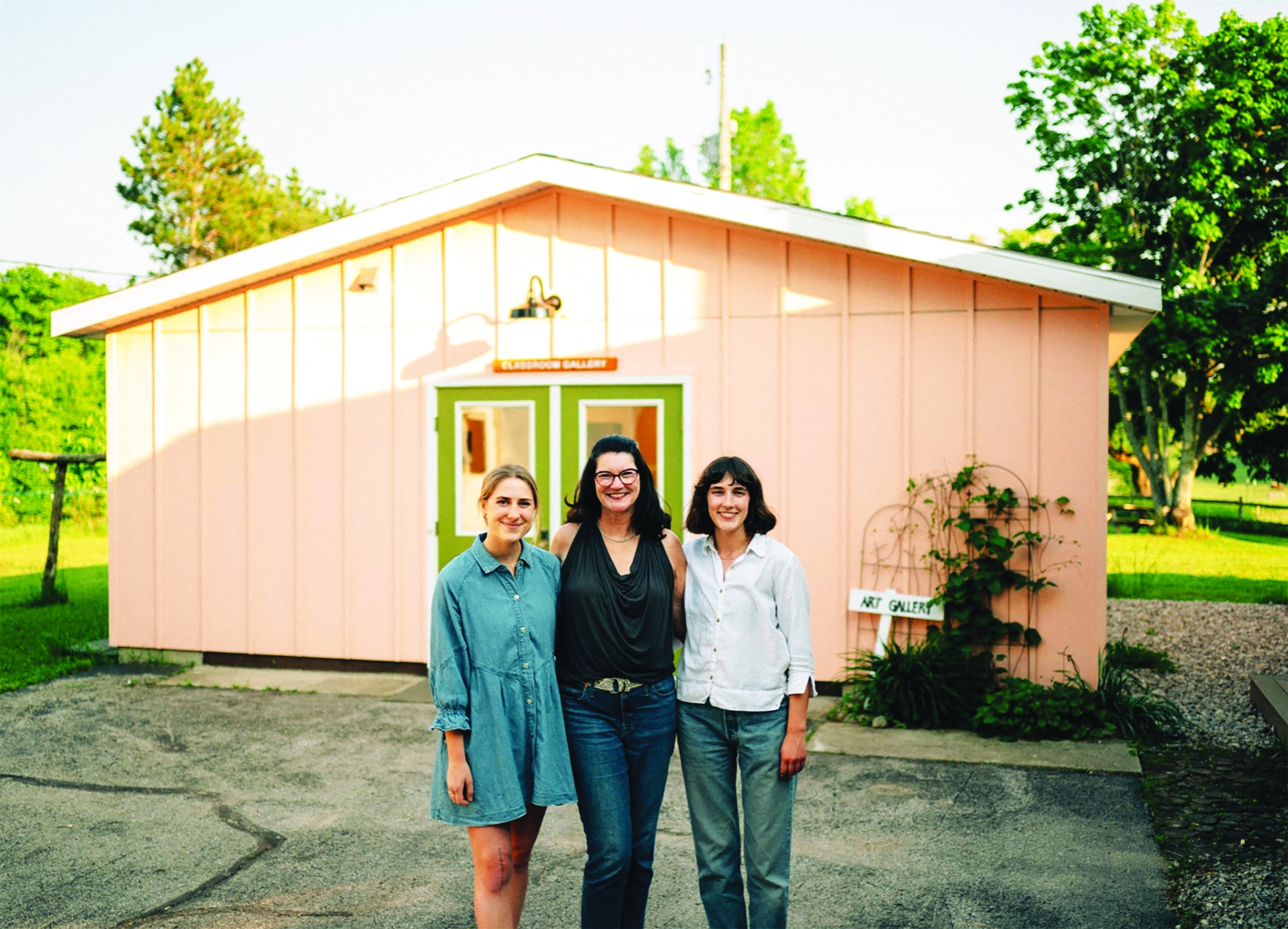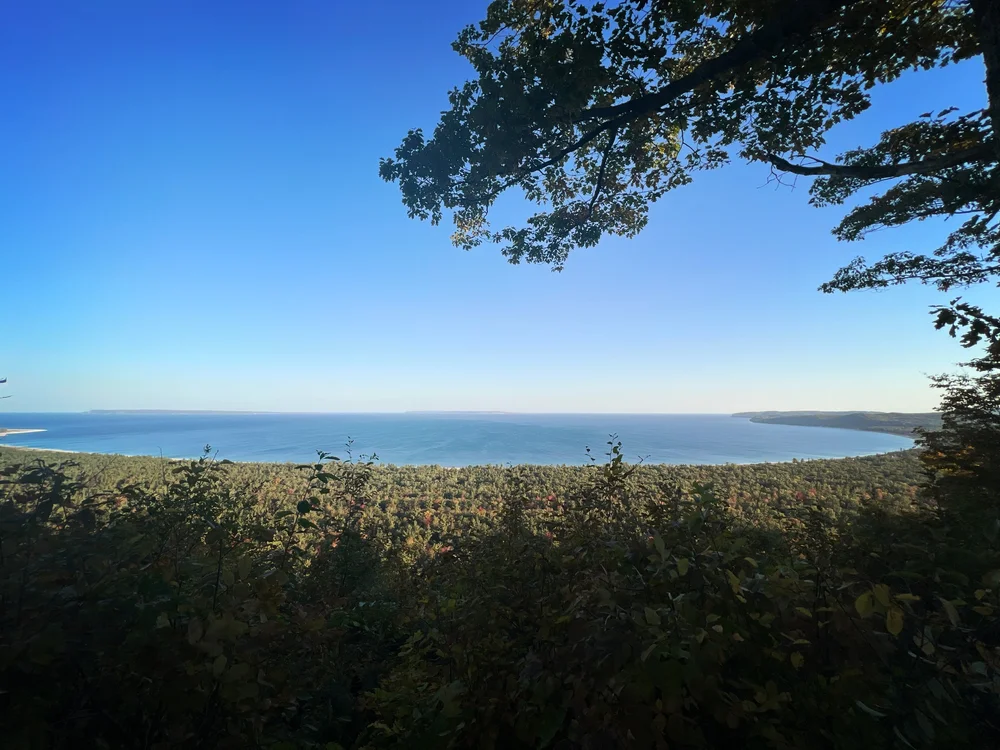A quest for learning: Green Door Folk School’s roots
From staff reports
Kristina (Lord) Schnepf (56) grew up in Saginaw and graduated from Eisenhower High School in 1987. She then went to Michigan State University, where she earned a Bachelor of Science degree in communications in 1992. The next year, she married her high school sweetheart, John Schnepf (56); the couple have two daughters, Kate (27) and Libby (26).
For the majority of her career, Kristina Schnepf worked in marketing and commercial roles at the Dow Chemical Company in Midland, before taking on executive roles at Goodyear Tire and other companies in Akron, Ohio.
In a wild turn, she left the corporate world in 2019 in pursuit of a simpler, more fulfilling life by becoming a business consultant and taking on a more active role in operating their family business—the Traverse City franchise location of Peace, Love, & Little Donuts—which they had owned since 2016.
In 2021, during the COVID-19 pandemic, the Schnepfs moved to Interlochen full time, replacing the small cottage they had originally bought in 2012. It was here that Kristina’s quest for learning sparked the creation of the new Green Door Folk School, located in Cedar in Leelanau County.
Schnepf developed an interest in woodworking around the same time that she left the corporate world. She tried finding classes locally—to no avail.
During that search, she stumbled upon “folk schools” in other parts of the country and the world, where there is hands-on, intergenerational learning that is focused on traditional skills, crafts, and community building, often rooted in a specific place and culture. Folk schools originated in 19th-century Denmark as a way to preserve and pass on knowledge and skills that might otherwise be lost to modern efficiency, while promoting a sense of community and personal growth.
Knowing that there are plenty of artists, artisans, and tradespeople with skills to offer here in northern Michigan, Schnepf began the process of creating Green Door Folk School, with the first classes beginning this past March. She brought on their youngest daughter, Libby, as the marketing director; hired Lauren Dahl (25) as program director; and more than 100 people from northern Michigan have taken classes in just the last few months—as well as some people making the drive from downstate or flying in from across the country to stay in short-term rentals or with friends for a weekend class.
The Sun caught up with Schnepf as she was preparing the fall schedule of courses for Green Door Folk School.
Glen Arbor Sun: What made you want to start Green Door Folk School?
Kristina Schnepf: I am a self-taught woodworker, and a couple of years ago, I was seeking classes that would help to grow my skills beyond what I was learning on YouTube and through trial and error in my workshop. When I looked for classes locally, there were very limited options, so I expanded my search and was introduced to wonderful places called “folk schools.” There are a number of folk schools throughout the country, and each is unique and reflective of its region. Not only did I want to take nearly every class offered, I was intrigued by the longer form classes that allowed for practice and skill-building, not just information-sharing. I immediately decided that our beautiful region—filled with remarkable artists and experts, as well as active, curious people—would be the perfect place for a folk school!
Sun: What does a typical day of work look like for you?
Schnepf: I am so fortunate to be able to spend my days with some of the most interesting people in our region. Working with artists, naturalists, and other experts to design inspiring class experiences; meeting the remarkable students who bring their curiosity to our classroom; sharing the joy of Green Door Folk School classes with potential students throughout our region—my days are varied and filled with the most interesting people. And on weekends, when most of our classes take place, I have a front row seat to the crackling energy created when curiosity and expertise meet. There are joyous, tender, hilarious, and exciting moments in every class where my colleagues and I look at each other with wide eyes and smiles and say, “This is our job! We get to do this for a living!”
Sun: Where does the name “Green Door” come from?
Schnepf: When my children were young, I painted the front door of our home a bright lime green. It was a lot—but I loved it. Some neighbors found it a little off-putting, based on their reactions to it. So, I wrote a simple poem to remind me and my family of what was on the other side of the green door: creativity, connection, compassion, and love. Exactly what I want Green Door Folk School to be known for, as well.
Sun: How have you seen your work grow and change? How do you hope that it will continue to grow? What is next?
Schnepf: We hosted our very first classes in March, so growth and change are part of our daily practice. We continue to learn what our community wants in form and content of classes. For the first few months, we hosted classes in a variety of places, but we just recently announced that we have found our home on the farmstead of Cedar North at J2 Farm in Cedar, so we are eager to settle in there and make it our own. Plus, every day, we are reaching new, diverse audiences of curious people seeking fulfillment, the opportunity to learn with others, and practices for living a more sustainable life. Honestly, that’s nearly everyone! Our ongoing challenge is in providing exceptional classes while both valuing the talent of our instructors and providing accessible prices for students. We are excited to soon be offering “sliding scale” pricing and other programs to give students more options, while enabling us to continue to offer the highest quality instructors and experiences.
Sun: What are some examples of classes that you have held so far, since you began in March? What classes are upcoming later this year?
Schnepf: We held 11 classes this spring and have more than a dozen classes available this summer. Some of my favorite classes so far have been spoon-carving, improvisational quilting, and making mushroom logs. Another fabulous class was hand-spinning yarn in Amy Tyler’s “Raw Wool to Yarn” class. We explored many different wool types and cleaned, carded, and spun our own yarn. It’s a remarkable experience to take a raw material like wool and transform it into a usable form. Beyond those, I’m excited about our upcoming farm-to-table cooking, natural dyes, and tension tray weaving classes yet this summer. Our fall season of classes will be launched on our website in July and will include some really special classes, too, so stay tuned for that announcement.
Sun: What do you think that you are doing differently than what others are providing?
Schnepf: We are keenly focused on building a fulfilling, valuable, comfortable experience for every student. We offer a unique educational environment that gives you a chance to learn practical skills in a welcoming setting. With expert instructors guiding each class, you’ll gain personalized, hands-on experiences that allow you to grow at your own pace. Whether you come for a single day or stay a little longer, our focus is on helping you to gain the know-how and confidence to keep exploring once you head home. As you shape, weave, or grow something with your own two hands, you’ll find yourself connecting—not just with the work but with others. What you take away is more than a skill; it’s a sense of belonging and confidence to keep building on what you’ve learned.
Sun: What kinds of things do you do for fun, when you are not working? What other things are you involved with? How did you get involved with them, and why are you passionate about these causes?
Schnepf: I love hiking and exploring the towns and villages of northern Michigan. I enjoy boating and swimming, going to the beach. I love woodworking and, most of all, learning new skills.
Sun: How have you seen northern Michigan change since you first came up here? What are your hopes for the area in the future?
Schnepf: We’ve been visiting the area for decades, and we moved here permanently about five years ago. We’ve certainly seen growth in tourism during that time. And in the last several years, the full-time population in our region is definitely growing—bringing with it all of the benefits and challenges that growth creates. I am grateful to our community leadership for forward-thinking strategies that ensure we are prepared to thrive with the changes that growth will create. My hope is that we continue to hold on to our unique northern Michigan culture, as we welcome new entrants to our community. Continuing to invest in art, music, craft, and our landscape will help ensure that what makes this place special remains for years to come.
Sun: What are the biggest challenges and rewards of living/working in northern Michigan? What is the best or most rewarding part of your job?
Schnepf: There are so many rewards for living and working in northern Michigan. Our people are optimistic, collaborative, and innovative. Our landscape is second to none. Opportunities to enjoy great food and culture are abundant. For me, the biggest challenge to living in northern Michigan is the weather in March and April. The most rewarding part of creating Green Door Folk School are the people I get to meet and work with. Our small Green Door Folk School team is brilliant and are some of the most creative people I know; our instructors are passionate and talented, and our students are curious and fascinating. You can’t help but be inspired and motivated to create exceptional learning experiences with and for these people.
Sun: What could northern Michigan do to attract more and/or retain talented people in this area? What else does northern Michigan need?
Schnepf: We already have so many assets that help northern Michigan to attract and retain talented people. In addition to the beautiful lifestyle that our environment affords, we have valuable educational services in Northwestern Michigan College [NMC], Interlochen Center for the Arts, and many strong school districts throughout the area. There is also exceptional support for entrepreneurs and small businesses with 20Fathoms and Venture North. Plus, we have a growing business and medical economy that both serves and employs thousands of members of our community. Top that off with well-maintained and protected parks, trail systems, forests, and lakeshores—this region can be a magnet for talent. What is needed, however, are the accessible services necessary for young professionals and growing families, such as affordable housing and childcare. In addition, ensuring our community is welcoming and inclusive to all people will only add to our ability to attract and retain talent in this area.
Learn more at GreenDoorFolkSchool.com online. Want to take a class? GreenDoorFolkSchool.com/classes/ Want to teach a class? GreenDoorFolkSchool.com/instructor-inquiry-form/ Want to receive Green Door Folk School’s e-Newspaper? GreenDoorFolkSchool.com/contact/#newsletter-subscribe Check out “Green Door Folk School” on Facebook or @GreenDoorFolkSchool on Instagram.
A version of this article first published in The Betsie Current, a Benzie County-based semi-sister publication to the Glen Arbor Sun.










